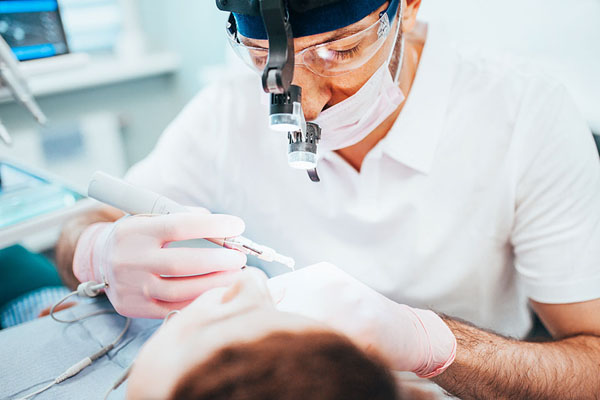Root Canal Therapy in Dearborn, MI
Don’t Live With Tooth Pain Any Longer
Root canal therapy saves a tooth that’s become infected or damaged. While many patients are apprehensive about root canal treatment due to its reputation, it’s a safe way to restore oral health and maintain natural teeth.
In this comprehensive guide, our Dearborn dentist explains the basics of root canal treatment to help patients prepare for treatment and feel more at ease going into their procedures. Contact our dental office today by calling (313) 914-4440 to schedule an appointment.
What Is Root Canal Therapy?
Root canal therapy is a dental procedure used to remove the infected pulp (the soft tissue inside the tooth) and clean and shape the root canals. The root canals are then filled and sealed to prevent bacteria from reinfecting the tooth. This helps save the tooth and prevent further damage or infection.
Each tooth has a soft inner layer known as the pulp. The pulp contains nerves, blood vessels, and connective tissue that keep the tooth healthy and alive. When the pulp becomes infected or damaged, it can lead to pain, sensitivity, and even tooth loss.
Anatomy of a Tooth
Each tooth consists of three main parts:
- Crown: The crown is the visible part of the tooth above the gum line. It’s covered by a protective layer called enamel, which is the hardest substance in the human body.
- Dentin: Beneath the enamel lies the dentin, a yellowish layer that forms the bulk of the tooth structure. Dentin isn’t as hard as enamel but still provides support and protection.
- Pulp: The innermost part of the tooth is known as the pulp. It contains nerves, blood vessels, and connective tissues, playing a vital role in tooth development during childhood.
When Is Root Canal Therapy Necessary?
Root canal therapy may be necessary for several situations, including:
- Dental Decay: When left untreated, a cavity can spread to the tooth’s pulp and cause infection.
- Dental Trauma: A tooth that’s been fractured or chipped can allow bacteria to enter the pulp and cause infection.
- Gum Disease: Gum disease can cause pockets around the tooth, allowing bacteria to enter and infect the pulp.
Root canal therapy is often the best way to treat these issues and prevent further damage to the tooth and surrounding tissue. Contact our top-rated dentist today.
Signs of Dental Infection
If you’re experiencing any of the following symptoms, you may have a dental infection that requires root canal therapy:
- Severe toothache
- Sensitivity to hot and cold temperatures
- Swelling and tenderness in the gums
- Discoloration of the tooth
- Pain when chewing or biting
If you’re experiencing any of these symptoms, schedule an appointment with Dr. Kalil Abraham as soon as possible to receive a proper diagnosis and treatment plan.
Benefits of Root Canal Treatment
There are many benefits to undergoing root canal treatment, including:
- Saving the Tooth: Root canal therapy can help save a tooth that would otherwise need extraction.
- Relieving Pain: Root canal therapy can help alleviate pain and discomfort caused by infection or damage to the pulp.
- Preventing Further Damage: By removing the infected or damaged pulp, root canal therapy can prevent further damage to the tooth and surrounding tissue.
- Restoring Function: With a filling in place, a tooth that has undergone root canal therapy can be fully restored and function like a natural tooth.
Endodontic Treatments
There are several types of endodontic treatment, and the type you receive will depend on your specific dental needs. Common endodontic treatments include:
- Root Canal Therapy: Involves removing the infected or damaged pulp and cleaning and filling the root canal. Once the root canal is filled, the tooth is restored with a filling or crown.
- Apicoectomy: In some cases, root canal therapy may not be enough to treat the infection or damage to the tooth. In these cases, an apicoectomy may be necessary. This involves removing the root’s tip and any infected tissue and sealing the root to prevent further infection.
- Pulp Capping: If the damage to the tooth is minor and hasn’t caused an infection, your dentist may recommend a pulp capping procedure. This involves placing special material over the damaged pulp to help it heal and prevent further damage.
- Regenerative Endodontics: This newer type of root canal therapy helps the damaged pulp in young teeth heal and regenerate. This involves using special materials to stimulate the growth of new pulp tissue and blood vessels in the tooth.
- Root Canal Retreatment: In some cases, a tooth that has undergone root canal therapy may become infected again. In these cases, non-surgical root canal retreatment may be necessary to remove the infection and restore the tooth.
The Root Canal Treatment Process
Here’s what you can expect with a root canal treatment:
- X-rays: Our dentist will first take an X-ray to see the shape of the root canals and determine if there are any signs of infection in the surrounding bone.
- Dental Sedation: A local anesthetic is administered to numb the tooth. This is done to make the procedure more comfortable for the patient. If you’re extra nervous, talk to your dentist to see if they offer dental sedation options.
- Pulpectomy: A hole is drilled into the tooth to create an opening. We’ll use specialized tools to remove the pulp, bacteria, decayed nerve tissue, and related debris from inside the tooth and its root canal.
- Cleaning and Shaping: After the pulp has been removed, our dentist will clean, enlarge, and shape the canals to prepare them for the filling. This process is usually accomplished with tiny files, and a disinfecting solution may be used to kill any remaining bacteria and wash away debris.
- Filling the Canals: Once the canals are cleaned, they’re sealed with a biocompatible material, usually a rubber-like material called gutta-percha. The gutta-percha is placed with adhesive cement to ensure complete sealing of the canals.
- Temporary Filling: A temporary filling material is placed on top of the gutta-percha to close the opening until the tooth is ready for its permanent restoration. We’ll remove this temporary filling before the tooth is restored.
- Restoration: After healing, the tooth will need a permanent restoration, such as a dental crown or a filling, to replace the lost tooth structure and provide a complete seal to the top of the tooth. This step is crucial to protect the tooth from infection or breaking in the future and to restore its function.
After the procedure, your tooth may be sensitive for a few days, but over-the-counter painkillers can usually manage this. Despite its reputation, most people report that the procedure is no more painful than receiving a dental filling.
Frequently Asked Questions
Is root canal therapy safe?
Yes! Root canal therapy is considered safe. The treatment involves removing the infected or damaged pulp from the tooth’s root canal and then filling it with a biocompatible material.
Can root canal therapy be done on any tooth?
Root canal therapy can be done on most teeth, but there may be some exceptions. Teeth with severe decay, extensive damage, or fractures may not be suitable for root canal treatment. In some cases, a tooth may need extraction instead.
How long does a root canal treatment take?
Generally, a root canal procedure can be completed in one or two visits. The duration of root canal treatment can vary depending on the tooth’s complexity and the extent of the damage. After the root canal treatment, the tooth may need to be restored with a crown or filling to protect it and restore its function.
Don’t Put Off the Treatment You Need
Root canal therapy may seem intimidating, but with the correct information and a qualified dentist, it can be a safe and effective way to treat various dental problems. By understanding what it is, how it’s done, and when necessary, you can make informed decisions about your dental health and get the care you need to keep your smile healthy and bright.
Call our Dearborn dental office at (313) 914-4440 to schedule a consultation today.


